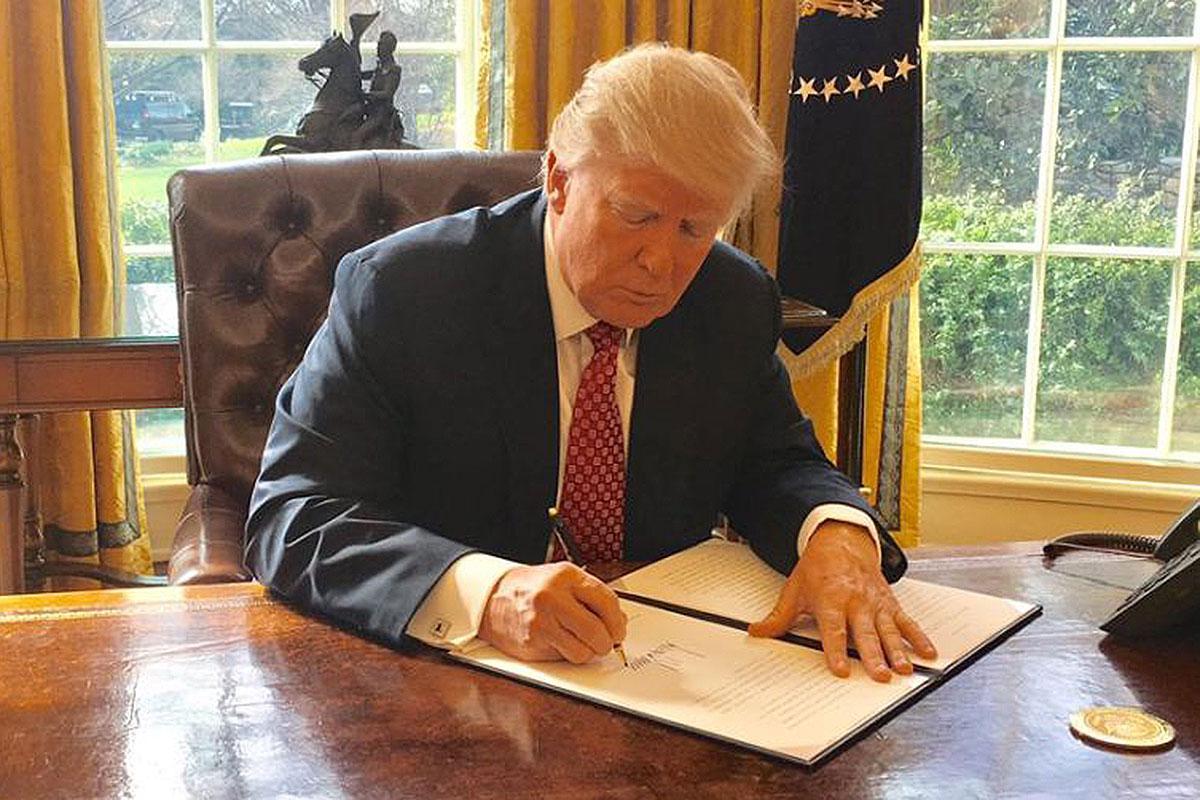Donald Trump's new travel ban suffers first legal setback
Syrian Muslim wins temporary restraining order barring enforcement against his family

Donald Trump’s new travel ban has suffered its first legal setback after a federal judge blocked its enforcement against a Syrian family trying to flee the war in their own country.
A Syrian Muslim who has already escaped to Wisconsin and is seeking asylum for his wife and three-year-old daughter who remain in the war-torn country filed a lawsuit on Friday alleging that Mr Trump’s second ban was just as problematic as the first.
The man, who said he was tortured in Syria, called the new travel ban anti-Muslim and claimed it violated his right to due process, equal protection and freedom of religion.
He wanted the ban to be declared unconstitutional and for a halt to be imposed on enforcement against his daughter and his wife, who according to the lawsuit has faced rape threats from pro-regime forces.
And hours after the man filed his complaint in Madison, Judge William Conley, chief judge of the federal court in Wisconsin's western district, issued a temporary restraining order barring enforcement against the family.
Setting a 21 March date for a full hearing of the issues, Judge Conley, an appointee of former President Barack Obama, concluded the Syrian man had "presented some likelihood of success on the merits" of his case and that his family faced "significant risk of irreparable harm" if forced to remain in Syria.
He set a 21 March date for a full hearing of the case.
Where this leaves Mr Trump’s second attempt at a travel ban was not immediately clear.
The restraining order does not block the entire travel ban, it simply prevents Mr Trump's administration from enforcing it against this specific family.
During a teleconference with Judge Conley on Friday, US government lawyers also argued that the new travel ban does not apply to asylum seekers like the Syrian man’s wife and daughter.
The Syrian’s lawyers, however, insist that it does.
The US Justice Department is continuing to defend the ban. Spokeswoman Nicole Navas said agency attorneys were reviewing the Syrian man's complaint and declined to comment further.
The controversial orders Donald Trump has already issued
Show all 9The Syrian man has been trying since 2016 to win asylum for his wife and daughter. He filed a federal lawsuit in February against the first travel ban. That lawsuit, though, was superseded by events when a federal judge in Washington state blocked the travel ban altogether.
Thinking the threat of a travel ban had passed, the wife and daughter started preparations to travel to Jordan for visa interviews at the US embassy, the last step before US customs officials decide whether to issue them visas.
But then came news that the second travel ban would come into force on March 16.
With the wife and daughter yet to be given dates for their visa interviews, the family now feared that they would be caught by the enforcement of the second travel ban.
With this in mind, the Syrian father filed his potentially groundbreaking new complaint on Friday afternoon.
It now remains to be seen whether the second travel ban will run into legal obstacles similar to those faced by the first ban, which started with an executive order issued by Mr Trump in January.
This stopped travellers from seven predominantly Muslim countries, including Syria, from entering the United States.
The first ban sparked numerous lawsuits, including the Syrian refugee's initial federal complaint in Wisconsin. US District Judge James Robart in Washington state blocked the ban on February 3.
Mr Trump issued a new order on Monday that removed Iraq from the list of countries and temporarily shuts down the refugee programme.
Unlike the first order, the new ban will not affect current visa holders and removes language that would give priority to religious minorities. Hawaii filed a lawsuit challenging the new ban on Wednesday; other states with Democratic attorneys general plan to sue next week.
According to the Syrian man's lawsuit, he fled his country to avoid near-certain death at the hands of two military factions, one a Sunni-aligned group fighting against President Bashar al-Assad's regime and one fighting in support of Assad.
The pro-Assad forces thought he was sympathetic to the other side and the anti-Assad army targeted him because he was a Sunni and travelled to pro-Assad areas to manage his family's business.
Both sides tortured him and threatened to kill him, the lawsuit said. The pro-Assad forces also threatened to rape his wife.
He came to the United States in 2014 and was granted asylum last year. He then began filing petitions seeking asylum for his wife and daughter.
He has filed all his court actions anonymously to protect his family.
Subscribe to Independent Premium to bookmark this article
Want to bookmark your favourite articles and stories to read or reference later? Start your Independent Premium subscription today.

Join our commenting forum
Join thought-provoking conversations, follow other Independent readers and see their replies